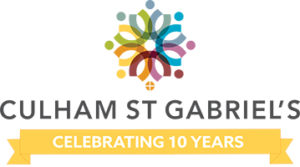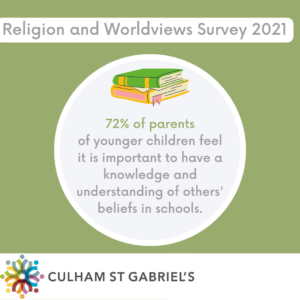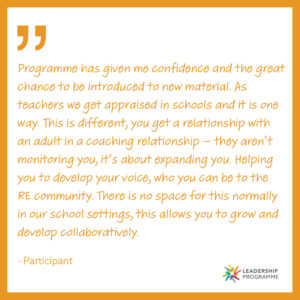
Culham St Gabriel’s Trust turns 10 years old on 21st June 2022! 2012 was an important year in many different ways- the Diamond Jubliee and the London Olympics spring to mind- I also turned 40 that year too! However, the birth of Culham St Gabriel’s bringing together two church college Trusts was a very significant moment for the religious education community. In this blog a former Chair and director express their reflections, alongside the current chair. I also draw out some themes running through the last 10 years and what these might mean for the next decade.
Reflections from the first Chair of Culham St Gabriel’s, Dr Priscilla Chadwick OBE…
‘Culham St Gabriel’s was created in 2012 by the coming together of two church college trusts which had worked in close partnership for several years prior to the merger. St Gabriel’s Trust arose originally from the college’s closure by Mrs Thatcher in 1977, leading to the transfer of its buildings to Goldsmith’s College. At that time, St Gabriel’s had only enough money to offer a few book grants each year, but a wise legal adviser had inserted a footnote to the transfer that, should Goldsmith’s ever wish to relinquish the buildings, these would revert to the St Gabriel’s trustees at the original price! Thus the trustees were able to sell the college on to another educational institution, thereby providing the Trust with a significant charitable endowment for the future.
The charitable objects enabled the trustees to support RE teachers wishing to enhance their postgraduate qualifications and later created an important partnership with the Culham Educational Foundation, setting up the St Gabriel’s Programme. This initiative developed innovative resources for RE and established the annual St Gabriel’s Weekend, firstly in Sunningdale and later at Wokefield Park, offering a free of charge opportunity for RE teachers to come together in a residential setting and share good practice, something that most would otherwise be unable to do, isolated in their own schools and often undermined by government educational policy: for many, these weekends were utterly transformative professional experiences which inspired them as they returned to their schools.
When in 2012 the two clerks of St Gabriel’s and Culham were both planning to retire, the opportunity arose for the two trustee bodies to come together, building on the cooperation over many years, to create the Culham St Gabriel’s Trust. Thus the significant legacy of both colleges would be safeguarded for future generations of RE teachers. With a generous endowment, this now meant that the Trust could more easily support major national initiatives such as the RE Council and the 2018 Commission on RE. This commitment vital to RE continues to flourish under the strong leadership of Kathryn Wright.’
What strikes me about Priscilla’s reflections is that the Trust’s focus on free, transformative, and inspiring resources and professional development still very much lies at the heart of the Trust. The reimagining of RE:ONLINE over the last few years, our scholarship programmes and the recent launch of our free e-learning platform continue to fulfil this mission.
Reflections from the first Director of Culham St Gabriel’s, Dr Mark Chater…
First, the merger itself: I gather that the idea first occurred to Priscilla and John Gay while on a walk. From this the idea grew, building on the many years in which the two former Trusts had worked together. Mutual trust, confidence and enthusiasm deepened. John Keast chaired the Implementation Committee which looked after the details – of which there were many! Within only a few years, Trustees saw themselves as ‘CSTG’ rather than ‘Former C’ or ‘Former St G’. Now, everyone takes the existence of the merged Trust for granted. But it was a major achievement at the time, based on shared vision and painstaking care over detail.
Modernising the grant application process to make it more user-friendly for applicants, and less burdensome for Trustees, was an early achievement. Putting it onto an online process with new, RE-focused grant criteria helped to place CSTG on the map. The feedback from grantees was positive. Sharing information and ideas with other RE grant-givers has also grown gradually.
Three significant CSTG grant decisions which, perhaps, have deeply influenced the course of RE for the medium term: Understanding Christianity, the NATRE/RE Today regional champions, and the Commission. The first of these had a long and at times lively gestation, but eventuated in resources which really enhanced the rigour and excellence of RE. The regional champions have strengthened the infrastructure of support available to teachers, and contributed to the growth and sustainability of NATRE. The Commission, which submitted its final report and recommendations in 2018, changed the conversation about the future of RE (or Religion & Worldviews) and we wait in joyful hope for a government bold enough to implement the much-needed change which it envisaged.
But that is not the end of the story. I hope and pray that CSTG will continue its vital leadership, support, and innovative thinking for many years to come.
Having worked with Mark for a number of years as a CSTG Consultant I think he instilled in me an understanding of the Trust’s forward-thinking approach. Mark’s reflections show how the Trust has always been sensitive to the ever-changing educational landscape, responding to new contexts. At its heart, though always remains the focus on serving others in the best possible way. Therefore, we have some exciting new grant making plans to announce. Firstly, we are launching special 10th Anniversary grant awards for small, innovative projects that make a difference. Secondly, later in the summer we will be sharing details of our new scholarship programme series to run alongside our current masters and leadership programmes. Watch this space!
Reflections from our current Chair, John Keast, OBE…
So CSG (as I think of it) is ten years old. How time flies! As we commemorate this milestone, my mind goes back to the two constituent trusts, with their illustrious Chairs, trustees and staff, as well as to CSG itself. There are too many to mention them all in this short piece, but their vision, dedication and skill not only served those trusts well, but led to the formation of what is now a very effective force for good in the world of religious education. As I retire as Chair of CSG this year, I indulge myself below in surveying the whole period from 2003 when I first became a trustee of both constituent trusts then the merged trust. What highlights come to mind?
First, the people:
- Three prominent and very effective chairs – Colin Alves, Tony Williamson and Priscilla Chadwick, each of whom had distinguished but varied careers in their own right, but brought their considerable expertise and experience to bear in building up the separate and then joint trusts.
- Four extremely competent and dedicated officers (although they had different job titles) – John Gay working for both Culham and St Gabriel’s separately, though often in partnership with Brenda and Peter Duffells at St Gabriel’s, and Mark Chater, first CEO of the merged trust. All of these excellent people served the trusts so well, along with some many other partners and consultants over the years, with whom they worked.
- The many trustees, who so well connected CSG to other organisations and spheres of influence, who brought the benefit of their links and experience to the work of the trust.
Second, specific events:
- The massive teacher conferences, mostly held at Wokefield, which did so much to inspire and build the confidence and morale of teachers in RE classrooms. Not cheap to put on, but how exhilarating, powerful and enjoyable they were!
- The smaller but very visionary colloquia, conferences and meetings which did so much to influence how RE both survived and thrived after the introduction and development of the National Curriculum, after the Great Education Reform Bill 1988.
- Working in partnership with other organisations in RE, again too many to mention.
The reference to teachers, meetings and partners above encapsulates some of the core aims of the trusts over the years – the importance of the teacher of RE, and providing opportunities for training and support via grants and events; the need to influence policy and curriculum development in RE both nationally and locally; and the support of RE in schools of all kinds, not just those with a religious character.
Times change, and so must the capacity of RE to respond. CSG is now very properly focussed on clear strategic objectives. These have become so important in the past ten years when the threats to the wellbeing and structure of RE, based as it still is on the 1944 Education Act model, have become more serious. So in the past ten years, in addition to its continued focus on teachers, CSG has developed a leading role in helping to bring the stakeholders in RE together, not least through its support of the RE Council, which is essential to the future of the subject. With its current CEO and Board, CSG will become and even more significant player in the RE community of the future. Long live CSG!
It has been a pleasure to work with John over the last three years. He will step down as Chair this summer, and the Trust will enter another new chapter. John’s emphasis on the importance of people shines through his reflections. Nurturing relationships with all our grantees is vital. Yes, we provide funding for individuals and projects, but we also want to invest in people. We often talk about becoming part of the CSTG family. Empowerment and collaboration are two of our values, and we aim to live these out through all our work. As we enter a season where a new Education Act is on the horizon, John’s final words will be vital. We will continue to strive towards our vision by:
- Increasing public understanding of religion and worldviews education
- Engaging with, informing and influencing decision makers
- Creating well-informed, empowered and influential educationalists
- Establishing and building strategic and collaborative partnerships and networks
- Commissioning and publishing focused and accessible research
- Championing and developing inspired and well-resourced teaching and learning
Here is to another ten years… and beyond!
Kathryn Wright and guests


